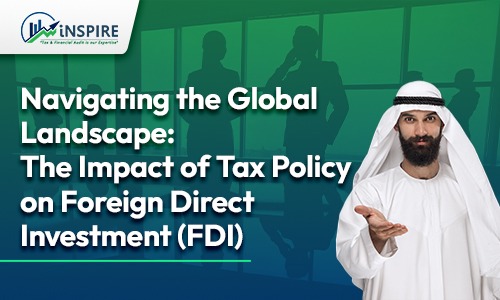
Navigating the Global Landscape: The Impact of Tax Policy on Foreign Direct Investment (FDI)
In today's interconnected world, foreign direct investment (FDI) plays a crucial role in driving economic growth. Companies transcend national borders, establishing operations and investing in new markets. However, their decisions are heavily influenced by various factors, and tax policy is a major player on this global chessboard. This blog explores the intricate relationship between tax policy and FDI, examining how tax regulations can attract or deter foreign investment.
Tax Policy as a Magnet or Repellent:
Tax policy acts as a powerful signal to foreign investors, influencing their decisions on where to allocate their capital:
- Corporate Income Tax Rates: Lower corporate income tax rates are generally considered more attractive to foreign investors, as they translate into higher potential returns on investment. However, other factors like tax stability and predictability also play a role.
- Tax Incentives and Credits: Governments often offer tax incentives such as tax holidays, special economic zones, or research & development tax credits to attract FDI. These incentives can significantly lower the tax burden for foreign investors, making a particular location more appealing.
- Tax Treaties: Double taxation occurs when a company's income is taxed by both its home country and the country where it operates. Tax treaties between nations help mitigate this issue, fostering a more favorable environment for FDI.
- Transfer Pricing Regulations: These regulations aim to ensure multinational companies price transactions between their subsidiaries at arm's length, preventing them from shifting profits to lower tax jurisdictions. While necessary, complex transfer pricing rules can add administrative burdens and potentially deter FDI.
Beyond Tax Rates: Other Considerations
While tax policy offers significant leverage, it's not the sole factor influencing FDI decisions. Investors also consider:
- Political and Economic Stability: Foreign investors seek stable environments with predictable regulatory frameworks and low political risks.
- Infrastructure and Workforce: A robust infrastructure, skilled workforce, and well-developed legal system are essential for attracting FDI.
- Market Access and Regulations: Easy access to target markets along with streamlined regulatory processes can make a location more attractive for foreign investors.
Tax policy is a crucial tool in a nation's arsenal to attract FDI. By implementing competitive tax rates, offering targeted incentives, and fostering a stable and transparent tax environment, governments can create an ecosystem conducive to foreign investment. However, a holistic approach is essential. Building strong infrastructure, fostering a skilled workforce, and ensuring market access are equally important in attracting and retaining foreign capital. By understanding the interplay between tax policy and other factors, nations can develop strategies to effectively leverage FDI for long-term economic growth and development.











